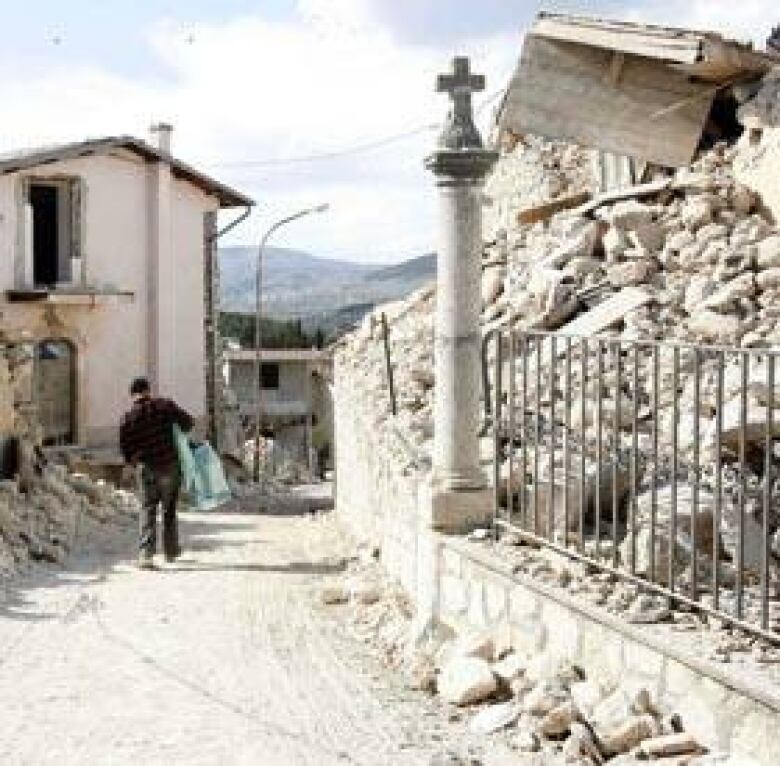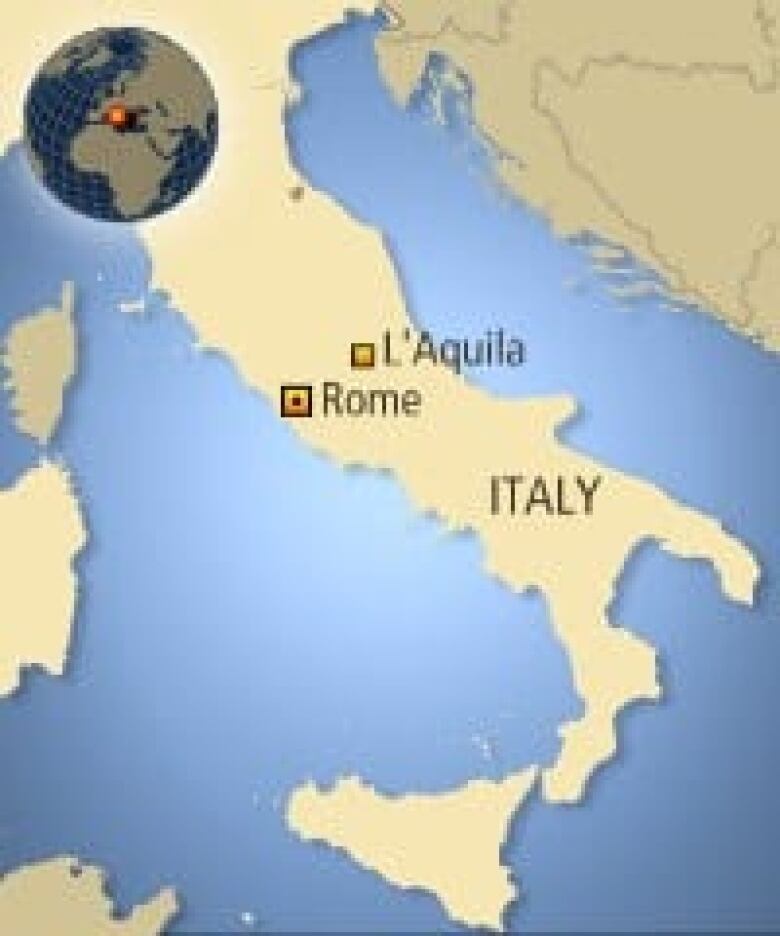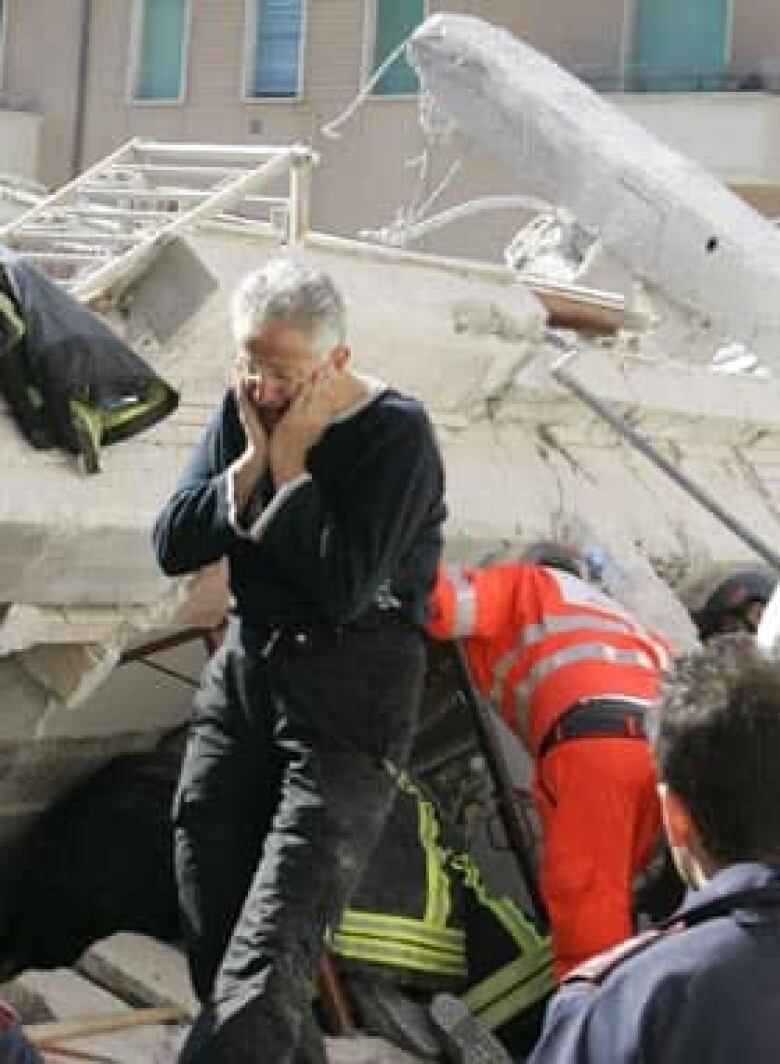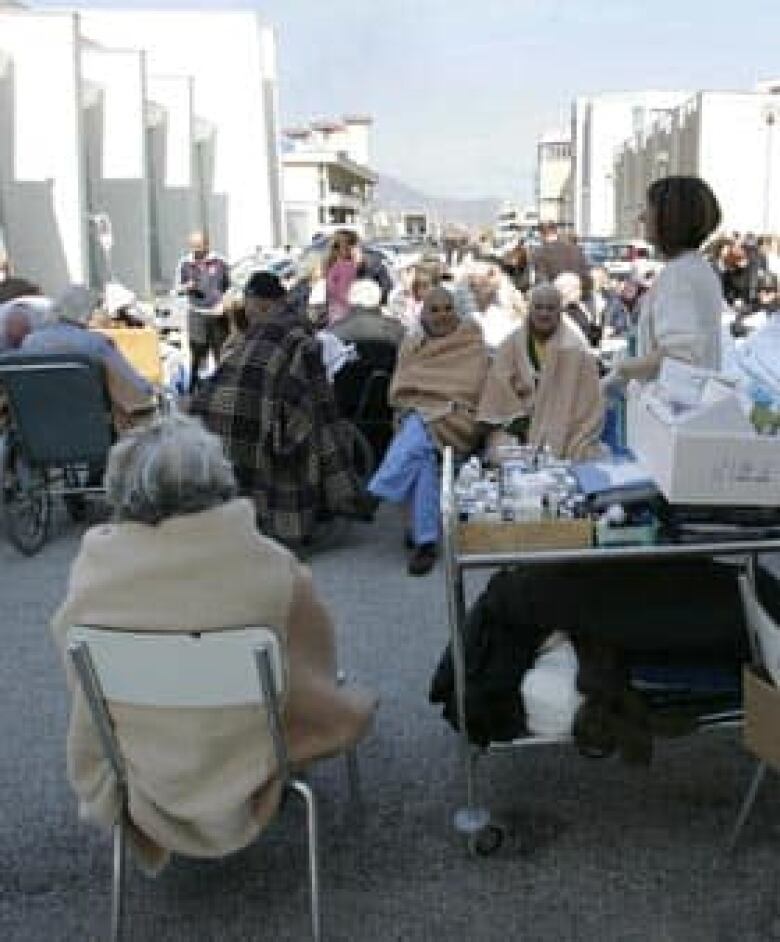More than 150 dead in Italian quake, PM says
Students trapped in collapsed university dorm
[GALLERY id=2123 cat=world]
Rescuers clawed through the rubble by hand, frantically searching for survivors, after a powerful earthquake struck central Italyearly Monday, killing more than 150 people and leaving tens of thousands homeless.
Italian Prime Minister Silvio Berlusconi called a state of emergency, telling an Italian television station late Monday that more than 1,500 people had been injured in addition to the 150 confirmed dead.
Italy's Civil Protection Agency, which is spearheading rescue efforts, was setting up temporary shelters for survivors. An estimated 100,000 peoplehave been lefthomeless, and up to 15,000 buildings damaged or destroyed,in the wake of the 6.3-magnitude quake, whichstruck shortly before dawn Monday near the medieval town of L'Aquila.
"We are setting up tents. We're trying to send people [to] a hotel in the nearby coast where they can be accommodated, they can be fed, they [can] have all the assistance medical, technical, psychological assistance they need," Agostino Miozzo, an official with the agency, told CBC News.
"We have a huge number of teams coming from all over the country with dogs, with fire brigade people. We are still finding people, wounded people, especially in the small villages far from L'Aquila."
'It was like it would never end'
Rain was complicating rescue efforts, butemergency personnelcontinued overnight with the help ofgenerators, Miozzo said.

Because of the risk of more quakes in the region, people were not allowed to remain in damaged homes, he added. More than 15,000 buildings have been declared off limits.
At the University of L'Aquila,a dormitory collapsed, trapping some half-dozen students under the rubble.Rescuersscoured through theruins by hand in the hopes of finding survivors, while firefighters with dogs combed the scene. Relatives and friends huddled under blankets and umbrellas nearby, waiting for news.
"We managed to come down with other students but we had to sneak through a hole in the stairs as the whole floor came down," said Luigi Alfonsi, 22, his eyes filling with tears and his hands trembling. "I was in bed. It was like it would never end as I heard pieces of the building collapse around me."
The body of one male student was pulled from the area.
Canadian family escapes
Meanwhile, a Canadian family that survived the earthquake feels lucky to be alive.

Tony Rambaldini of Montreal who has owned and operated the Canadian Hotel in L'Aquila for 20 years fled his home in his pyjamas and described the scene in an interview with CBC News.
"We were sleeping at 3:40 [a.m.]and then all we heard was a rumbling loud sound, something similar to a 747 taking off. Everything was just vibrating vertically and horizontally. I jumped towards my daughter's room and grabbed her and my wife and away we went," he said.
"My wife is a little shook up now. She's reacting now more than this morning. My daughter's OK. She was terrified at first. Everybody's outside. Any green space there is, people are lying there with their cars, children and family."
Rambaldini said he and his family planned to sleep in their car and also erect a tent, where they feel "more secure," on Monday night.
"They're taking out dead people in blue pouches," Rambaldini said. "It's not a pleasant sight. A lot of children are dead also."
The quakeshook 26 towns and cities in the Abruzzo region in the Apennine Mountains, 110 kilometres northeast of Rome, at about 3:32 a.m. local time.L'Aquila was hardest hit, with many residents sleeping as their homes collapsed around them.
Angela Palumbo, 87, told Reuters she "woke up hearing what sounded like a bomb."
"We managed to escape with things falling all around us. Everything was shaking, furniture falling. I don't remember ever seeing anything like this in my life."
Though not a major tourist destination like Rome, Venice or Florence, the area is known for its ancient fortifications and tombs of saints. Many Romanesque, Gothic, Baroque and Renaissance landmarks were damaged.
"The damage is more serious than we can imagine," Culture Ministry official Giuseppe Proietti said. "The historic centre of L'Aquila has been devastated."
Many of the town's houses weren't built to withstand a quake, and old structureshadn't been retrofitted for seismic safety, said Enzo Boschi, the president of the National Institute of Geophysics and Vulcanology.
Possibility of quake predicted
Italian seismologist Gioacchino Giuliani had predicted the possibility of a major quake around L'Aquila several weeks ago, based on the concentration of radon gas in the area.

At least nine smaller tremors had hit the area since the beginning of April.
Giuliani was reported to police for "spreading alarm" and was forced to remove his findings from the internet.
The Civil Protection Agency had reassured locals at the end of March that the tremors were normal for the seismic area. Agency head Guido Bertolaso insisted at a press conference on Monday that no quake could ever be predicted and no evacuation could have been ordered on the basis of the recent jolts.
"There is no possibility of making any predictions on earthquakes. This is a fact in the world's scientific community," Bertolaso said.
Stefania Pezzopane, provincial president of L'Aquila, said residents may have been lulled into complacency because ofso many smaller quakes.
"Considering what happened, a bit more concern, more attention might have saved lives," Pezzopane said.
L'Aquila Mayor Massimo Cialente said at least 100,000 people have currently been forced from their homes due to destruction and concerns about damage that could cause other buildings to collapse.
"This means that we'll have several thousand people to assist over the next few weeks and months," Miozzo said.
Evacuees converged on an athletics field on the outskirts of L'Aquila where a makeshift tent camp was being set up. Civil protection officials distributed bread and water to people who lay on the grass next to heaps of their belongings.
Hotels on the Adriatic coast are being requisitioned to shelter the homeless, Berlusconi told reporters at a press conference in L'Aquila.
L'Aquila's streets littered

In the city, twisted steel supports, slabs of walls, furniture and wire fences were strewn about the streets and cars were buried under rubble.
In the streets of L'Aquila, residents covered in dust pushed carts full of clothes and blankets that they had hastily packed before fleeing their homes.
"We left as soon as we felt the first tremors," said Antonio D'Ostilio, 22, as he stood in the streets as aftershocks continued in the region. "We woke up all of a sudden and we immediately ran downstairs in our pyjamas."
Firefighters aided by dogs are continuing to try to rescue people from crumbled homes in L'Aquila. Rescues crews demanded quiet as people huddled in the streets so they could listen for signs of life from people trapped in the rubble.
Residents and rescue workers worked together to haul away debris by hand and pull out survivors and bodies.
Pope prays for victims
Although the wounded were transported tothe city'smain St. Salvatore Hospital, parts of the building were evacuated out of fears the structure could also collapse.

Two operating rooms in the hospital remained open, said regional health director Roberto Marzetti.
Medical staff were attempting to treat some patients outside while others were being transported to other facilities. Civil protection crews scrambled to erect a field hospital to deal with the influx of wounded.
Hospitals in the region were appealing for the help of doctors and nurses across Italy while Health Minister Maurizio Sacconi urged Italians to donate blood. Bridges and highways in the region were closed as a precaution.
"Some towns in the area have been virtually destroyed in their entirety," said Gianfranco Fini, speaker of the lower house of parliament, before the chamber observed a moment of silence.
Pope Benedict XVI prayed Monday for the victims and sent a message to the archbishop of L'Aquila. Messages of condolences flooded into the region from around the world.
The last major quake to hit central Italy, a 5.4-magnitude temblor, struck the south-central Molise region on Oct. 31, 2002, killing 28 people, including27 children who died when their school collapsed.
With files from the Associated Press












_(720p).jpg)


 OFFICIAL HD MUSIC VIDEO.jpg)
.jpg)



























































































